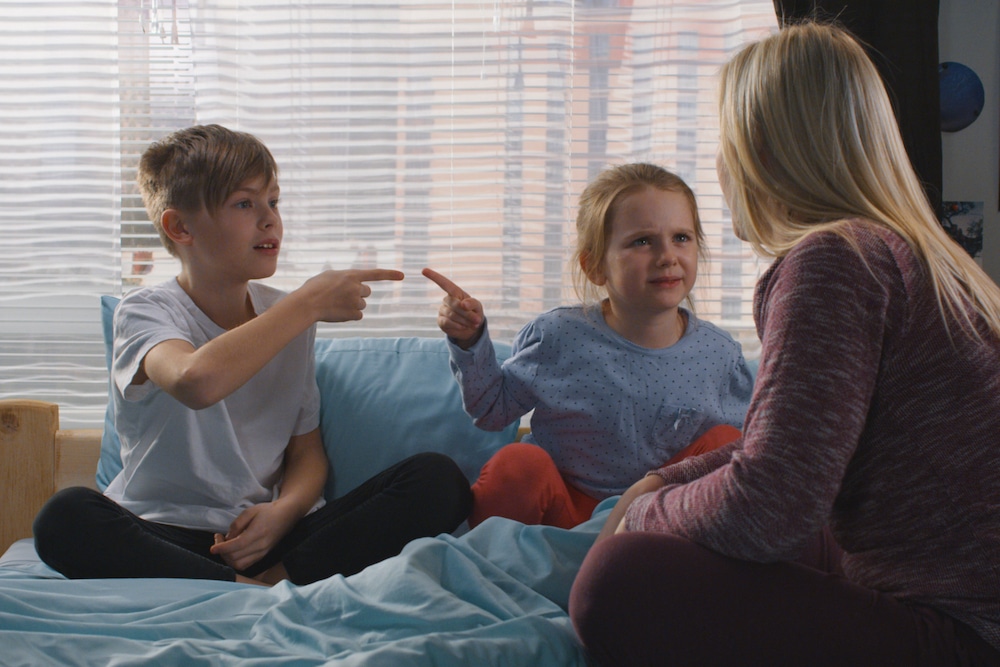Tips to Managing Sibling Conflicts
Parenting Tips: Managing Sibling Rivalry and Conflicts
How to Keep the Peace Between Siblings
It can be incredibly frustrating to see your kids playing together nicely one moment, then suddenly it turns into another argument with yelling, crying, and hitting. We want our kids to look out for each other and play nicely together, so it may feel stressful to see conflict between siblings. It is expected for siblings to argue at times, but when the arguments feel difficult to manage as a caregiver, there are things you can try to improve sibling relationships.

The good news about sibling conflict is that it is an excellent way for kids to learn how to assert themselves, problem-solve, understand what it means to be fair, and compromise. These skills will translate to settings outside of the home, including at school, work, activities, and with friends, future roommates, coworkers, and more. The goal should not be to eliminate conflict, but instead help your kids learn how to productively handle disagreements. Conflict resolution is a learned skill and takes time to develop.
Child psychologist and author of Getting to Calm, The Early Years, Laura Kastner, says, “The sibling is the garbage can of the universe because you have to be nice to everyone else.” Expectations to get along with peers at school often don’t apply at home, and kids may take out their pent-up frustration from school on their siblings. It’s hard for young kids to regulate their emotions, which also makes sibling conflict more likely. Kids often show their feelings through their behavior, so anger or worry might show up as hitting, yelling, pushing, and refusing to share with their sibling(s).
Here are a few tips to prevent sibling conflict:
One-on-one Time
Spend more one-on-one time with each child. When each child feels they are receiving enough attention from their parents, they will feel a greater sense of love and belonging in the family.
Family as a Team
Emphasize that your family is a team. This doesn’t mean you have to like each other all the time, but it means you look out for one another, trust each other, and work towards a common goal.
Discuss Expectations
Discuss expectations of each child, as well as parent(s), using a family contract. Outline specific rewards and consequences for behavior. Here are two examples:
Model positive behavior and conflict resolution skills within the family. Children learn by observing their parents’ interactions. Demonstrate respectful communication, empathy, and compromise in your own relationships.
Here are some more tips to mediate sibling conflict:
Ignore it for as long as you can.
Encourage your kids to sort out their conflict on their own, offering ideas as needed. When it escalates and/or turns physical, prioritize calming the conflict.
Reiterate Ground Rules
Remind your kids of ground rules for the process of mediating conflict. This can include no interrupting, no name-calling, no yelling, no insults, and so on. Ground rules apply to adults as well, so remember to reserve your judgment of the situation.
Relaying Sides of the Story
Request for each sibling to calmly relay their sides of the story. Clarify that they need to take turns. This helps each child identify what it was that happened that made them upset.
Share Feelings
Ask each child to share how they felt during the conflict. This helps them learn how to listen and understand their sibling’s perspective.
Brainstorm
Brainstorm solutions, asking the kids to share their ideas first. Allow them to have a say in the mediation process. Chime in as needed, offering realistic and equitable ideas.
When all else fails…
If all else fails, offer strategies like rock-paper-scissors or flipping a coin to mediate their conflict.
Praise Your Kids
Praise your kids when you see them displaying positive behavior, including but not limited to the following: working through arguments among themselves, discovering equitable solutions, being good sports, playing fairly, taking turns, and expressing their feelings with words.
Seek Professional Help
Seek professional help if needed. A family therapist can provide strategies tailored to your family’s specific dynamics and help address underlying issues.
Remember that building positive sibling relationships takes time and effort. Be patient, consistent, and supportive in your approach. Over time, your children can learn to appreciate and value each other, developing a strong lifelong sibling bond.
Your Marvelous Minds Team
![]()
Sources:
- https://greatergood.berkeley.edu/article/item/how_to_teach_siblings_to_resolve_their_own_arguments
- https://www.positiveparentingsolutions.com/sibling-rivalry
- https://www.canr.msu.edu/news/helping_siblings_get_along



